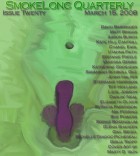Every story, every piece of writing, contains energy. For me, this story felt frenetic. How did you feel while writing it?
I felt anxious and kind of repulsed. But also caught up in writing it.
I love the beauty of the language used to tell the story contrasted against the darkness of the story’s events. It gets to me. What, or who, gets to you?
Thank you. Nancy Lemann in Lives of the Saints. Robert Olen Butler in They Whisper. Many more as well, but those are the first that come to mind at the moment.
It’s unusual to find demarcated scenes in flash, and yet the composition works well in this case. Talk a bit about the structure of this piece, and how you arrived at it.
I didn’t plan on the structure, but I pictured each scene in my mind as I was writing the one before it. When I finished the first draft and decided to go with the three scenes, I hoped the structure would have a feel similar to ’60s French cinema.
What is the status of your flash and prose poetry journal, Wild Strawberries?
I have issue four ready to finalize and print, but have been stuck at this point with it ever since the New Orleans evacuation. I love every story in the issue, and when I grab a few minutes to work on the proofing I could almost cry because I’ve been holding these pieces so long. I will be thrilled to finally have the issue ready to go and be able to share these writers’ work with readers.
While reading through the annual Kathy Fish Fellowship applications, I was struck by the number of writers who were using flash as, to paraphrase, a means to an end. Most people weren’t writing flash because they loved the form, because it took them places other types of fiction didn’t. Instead, they were using it as a gateway into longer works—short stories, short story collections, novels. As a champion of flash, I found this discouraging. Is flash fiction less satisfying, in terms of either writing or reading, than longer works? Or is it that the markets still haven’t accepted flash as a legitimate form? Why do you write flash, and where do you see it taking you?
I’m also surprised to hear that, “a means to an end.” Flash is actually more satisfying to write, to me, because I can write the first draft in one sitting, in one flow of energy, and then revise during later writing sessions. Flash and longer works can be satisfying or not to read, depending on the piece, the quality of writing, the match between writer and reader. A great flash can be like a meditation, something that stays with you, something to go to over and over again. I started writing flash because I like to finish a first draft in one session, without losing momentum. But now, I just love the form, the difficulty, the challenge of making it work. I’d like to publish a collection of flash, and also to write a novel told in a series of flash scenes. Flash can be versatile, fluid. I still see the form as very open, with precedent but also changing, full of possibility.


 The core workshop of SmokeLong Fitness is all in writing, so you can take part from anywhere at anytime. We are excited about creating a supportive, consistent and structured environment for flash writers to work on their craft in a community. We are thrilled and proud to say that our workshop participants have won, placed, or been listed in every major flash competition. Community works.
The core workshop of SmokeLong Fitness is all in writing, so you can take part from anywhere at anytime. We are excited about creating a supportive, consistent and structured environment for flash writers to work on their craft in a community. We are thrilled and proud to say that our workshop participants have won, placed, or been listed in every major flash competition. Community works.